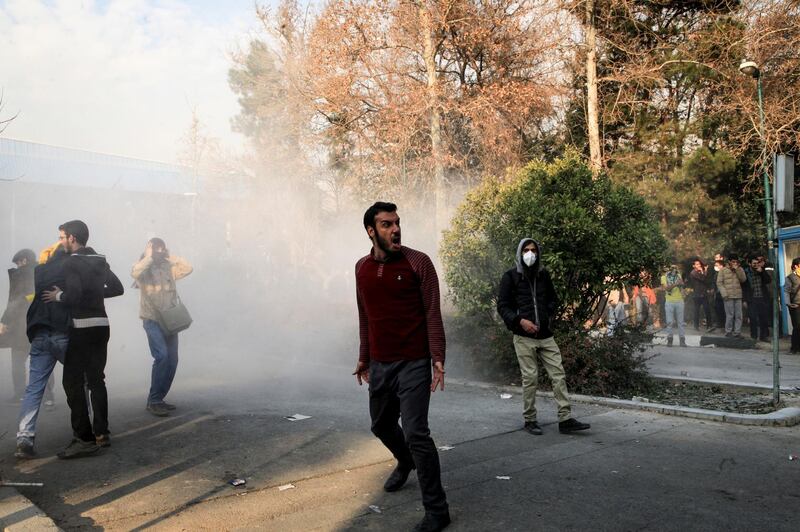Iranians took to the streets for a fifth night of demonstrations on Monday in a snub to the country’s clerical leadership as tensions rose further with the first killing of a police officer.
A gunman killed the officer and wounded three others in the central city of Najafabad, according to Iran’s semi-official Mehr news agency, bringing the total number of dead during the largest protests against the regime since 2009 to at least 13.
Cars were reportedly torched in Tehran after nightfall on Monday as protesters chanted anti-government slogans in defiance of an appeal for calm by president Hassan Rouhani on Sunday night when he promised more "space for criticism".
"The people are absolutely free in expressing their criticisms and even protests," Mr Rouhani told his cabinet in remarks reported on state media. "But criticism is different to violence and destroying public property."
On Monday, he tried to play down the unrest in a statement on the presidency website.
"This is nothing," Mr Rouhani said. "Our nation will deal with this minority who chant slogans against the law and people's wishes, and insult the sanctities and values of the revolution.
Ten people were reported killed Monday in the most deadly night of violence since protests began in the second city Mashhad on Thursday. State media said that armed protesters tried to over-run police stations and military bases.
Six people were reportedly killed by gunfire in the western town of Tuyserkan, and a local lawmaker said two people had been shot dead in the south-western town of Izeh.
"People of Izeh, like some other cities, held a protest against economic problems and unfortunately it led to the killing of two people and injuries to some others," Hedayatollah Khademi, the local MP, told the ILNA news agency, adding it was unclear who had fired the shots.
The state broadcaster said two others died in the western town of Dorud when they were hit by a fire engine stolen by protesters, and ILNA reported a school for clergy and government buildings were burnt in the north-western town of Takestan.
Although media access has been restricted, videos on social media showed demonstrations in many areas of the country. New protests broke in Tehran on Monday, with reports on social media of a heavy police presence in the centre of the capital.
The protests have become the biggest test for the regime since demonstrations following the disputed 2009 presidential election.
Police used tear gas and water cannons to disperse a small protest in Tehran's Enghelab Square on Sunday evening, according to unverified social media videos. There were also reports of protests in the cities of Kermanshah, Khorramabad, Shahinshahr and Toyserkan in the west, and Zanjan in north Iran.
More than 400 people have been arrested in the four days of protests.
_______________
Read more:
Iran unrest is 'start of a big movement': Nobel Peace Prize-winner Ebadi
Protesters 'shot dead' during third day of demonstrations in Iran
_______________
Verifying reports remained challenging due to travel restrictions and sporadic blocks on mobile internet and social media sites, including Telegram and Instagram.
The protests began as demonstrations against economic conditions in Mashhad but quickly turned against the government, with thousands marching in towns across Iran to chants of "Death to the dictator".
US president Donald Trump, a critic of Tehran, commented again on the protests in tweets on Monday.
"Iran is failing at every level despite the terrible deal made with them by the Obama administration," Mr Trump said, referring to the nuclear pact agreed under his predecessor Barack Obama.
"The great Iranian people have been repressed for many years. They are hungry for food & for freedom. Along with human rights, the wealth of Iran is being looted. TIME FOR CHANGE!"
In a statement, Boris Johnson, Britain’s foreign secretary, said that the UK was watching events carefully.
“We regret the loss of life that has occurred in the protests in Iran, and call on all concerned to refrain from violence and for international obligations on human rights to be observed,” he said.
Mr Rouhani had dismissed Mr Trump's earlier comments on Sunday.
"This man who today in America wants to sympathise with our people has forgotten that a few months ago he called the nation of Iran terrorist."
State media began showing some footage of the demonstrations on Sunday, focusing on young men attacking banks and vehicles, an attack on a town hall in Tehran, and images of a man burning the Iranian flag.
"Those who damage public property, disrupt order and break the law must be responsible for their behaviour and pay the price," interior minister Abdolrahman Rahmani Fazli said on Sunday.
There have been reminders of the continued support for the regime among conservative sections of society, with pro-government students staging counterdemonstrations at the University of Tehran over the weekend.
Meanwhile, Bahrain became the first Arab Gulf state to issue a travel warning for Iran. The foreign ministry called on citizens not to travel to Iran "under any circumstances" because of protests there, and also urged any Bahrainis in the country to leave immediately.
In a statement on Twitter, the ministry cautioned that Iran was seeing "large-scale disturbances and an unstable security situation" as well as "grave acts of violence".
Bahrain's Shiite community generally travels to Iran for religious reasons, although relations between the countries are strained over allegations by Manama that Tehran interferes in its internal affairs.





